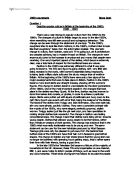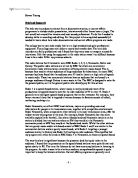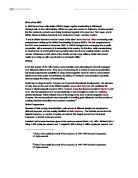Describe popular culture in Britain at the beginning of the 1960's (1960 - 1965) There was a vast change in popular culture from the 1950's to the 1960's. The changes
Describe popular culture in Britain at the beginning of the 1960's (1960 - 1965) There was a vast change in popular culture from the 1950's to the 1960's. The changes of culture in Britain began to occur in the late 1950's, when everything was still seen as adult and outrageous behaviour. This change can be seen through the statement of one lady: "In the 1950's, daughters tried to look like their mothers, in the 1960's, mothers tried to look like their daughters," taken from the information booklet. This dramatic change in culture, from fashion, radio and TV to going out, art & architecture and peoples opinions, had a massive impact on Britain. The changes in were enormously down to the increase in employment and money that people were receiving. One very important aspect of the sixties, which became extremely clear, was a total lack of respect for the traditional ideas and values. Fashion in the 1950's was extremely different to what it was soon going to become. The 50's saw figure hugging clothes, with very little skin being revealed to the world, with women's essentials being headscarfs, turbans, basic military style suits and the sturdy wedge shoe of wartime Britain. At the beginning of the 1960's there were only a few signs of the major developments that were to take place in Britain. Fashion in the 1960's became more short skirts and straight dresses, showing off the
7. Assess the role of the mass media in Britain during the inter-war period
7. Assess the role of the mass media in Britain during the inter-war period. It is impossible to assess the media's role in the inter-war period without firstly understanding the main source of news in this era. Within this essay I intend to look at the changes in perceptions of the media by the public and government and also the main incidents and characters with helped shape this new opinion. Although newspapers were widespread throughout Britain a combination of economic circumstances and low literacy rates meant that only a percentage of the population would be aware what was happening in the country as a whole. The medium of radio, and one company in particular, was to change the face of modern mass media. The British Broadcasting Corporation (BBC) was initially the British Broadcasting Company, an organization consisting of a number of wireless manufacturers, which went on air in 1922. It did not have a government dictation of what to air so could therefore have aired anything that would have made wireless sets sell. However, the director of the company, John Reith did not agree with this view and took the first steps in creating a public service broadcaster. This was a distinctive moment in the development of the BBC and was crucial in determining the path the BBC would take. Whilst Reith and the idea of the BBC as a public corporation was perhaps the most
Produce an extract from a documentary series, or current affairs programme to include studio presentation, interview and either theme tune or jingle.
Brief and Research The task was to produce an extract from a documentary series, or current affairs programme to include studio presentation, interview and either theme tune or jingle. The text would last around five minutes and must sound professional. To do this I needed to develop skills in recording and editing. For this project to be completed successfully I needed to know about how radio documentaries and current affairs programs are made. The college has its own radio studio that is to a high standard and quite professional equipment. The college uses mini disks to record and transfer data. The mini disk recorders are fairly professional and I found that they were easy to transport around for interviews. I felt that using the equipment in the radio station wasn't too difficult because I use to be a radio DJ for my previous schools. The radio stations that I listened to were BBC Radio 1, 2, 3, 4, Newcastle, Metro and Galaxy. The public radio stations are all ran by BBC the others are commercial. Commercial radio stations have a convention of being entirely music based. This is because they need to attract audiences of large audiences for advertisers. In recent BBC surveys they have found that the audience over 35 tend to listen to a high ratio of speech to music radio. These two commercial stations have an audience that are biased to a younger audience although
To what extent was the BBC in the 1920s the personal creation of John Reith?
To what extent was the BBC in the 1920s the personal creation of John Reith? John Reith was the first general manager of the BBC between 1922-1927, and its director general between 1927-1938. In 'Power Without Responsibility' Curran and Seaton interpret that Reith played a large part in shaping the BBC in the 1920s. They argue that if Reith had not been appointed the BBC's general manager "many of the features of broadcasting which are taken for granted today would certainly be absent."1 They also argue that "Reith's domination of the Corporation in its early days was massive, totalitarian, and idiosyncratic, and for many decades the traditions of the BBC seemed to flow directly from his personality."2 However, Williams states in "Get Me A Murder A Day" that such interpretations are flawed, as to "see the BBC and the form of broadcasting established in Britain between the wars as the product of one man is to misinterpret the nature of the times. Broadcasting was shaped as much, if not more, by social, political and cultural factors of the period."3 I believe that social and political factors were the dominant force in shaping broadcasting and the BBC in the 1920s, although Reith's influence cannot be ignored. John Reith can be seen as enormously influential on the early development of the BBC. This was mainly through his shaping of the course of programming, transforming
The fundamental problem of layout planning for assembly is to determine the minimum number of stations (workers) and assign tasks to each station so that a desired level of output is achieved.
Defining the Layout Problem The fundamental problem of layout planning for assembly is to determine the minimum number of stations (workers) and assign tasks to each station so that a desired level of output is achieved. Notice several implications in this statement. First, the design focuses on achieving a desired level of productive capability.(output capacity). Second, if tasks are to be assigned to stations, the sequence of tasks must be considered. Which tasks must be done first, and which ones may follow? Finally, our concern is attaining desired output efficiently, without using unnecessary input resources. Capacity, Sequencing and Efficiency Let's illustrate these ideas with an example. A manufacturer is developing plans for a facility to make 320 aluminum storm windows. The desired minimum daily output capacity is 320 windows. Figure-I and Table-I show the tentative assembly line layout. The operations manager wants to know if this is a good design and if better designs are possible. A B C D E F G H Figure-I : Diagram for storm window assembly line Table - I: Initial assembly line layout for aluminum storm windows Work Station Preceding Work Station Task Assigned Task's Required Predecessor Task Time/Unit (in seconds) - A: Assemble Frame None 70 2 B: Install rubber molding A 80 3
the lisbon agenda UK Response to enhancing skills is insufficient
Lisbon Agenda For 2005 - 2010 UK Response to enhancing skills is insufficient By Yasmin Latif BA Public services student, Position Paper for Politics Age of Global Competitiveness, Professor Paul Cammack Date 09th November 2006 Contents . Introduction pg.3 2. UK Position pg.4 3. Comparison pg.8 4. Conclusion pg.10 5. Bibliography pg.11 Introduction The Lisbon Agenda is a programme brought by the EU (A8, Czech Republic, Estonia, Hungary, Latvia, Lithuania, Poland, Slovenia, Slovakia) to make Europe competitive in the economic and knowledge- driven world today by 2010. It was initiated in 2000 but due to failure of several related procedures was delayed and relaunched in 2005. Specifically UK's target set is for it to become competitive in the global economy, looking at where it'll be in the investment in skills and strategies for employment. UK aims to create a balance of fiscal sustainability and funds for welfare allowing ageing population to be a part of this equation and making Britain a knowledge-driven society by giving more young people necessary education, training (skills) where the 25plus and 50 plus making either education or employment a realistic opportunity channelled through the emergence of innovation, technology, speed of learning, getting people off benefits. I will be looking at what measures should be taken to
A Scripted Piece
(SFX - a real smoothly romantic music playing in the background) Annc. The first thing a man notices when he walks past a woman is if she smells attracting. Man. Oh (holds), what is that beautiful smell...(acting the lines if he had never felt some thing so good) it smells gorgeous! Wom. Why (really surprised), thank you...(like she has just seen the man and he is stunning) you smell beautiful too. (Trying to chat him up) Man. No, I mean it; it smells so attracting... it's making me wanting to drop at your feet. (So serous and in is tone sounding like he is interested in her and him is almost dropping to her feet) Wom. (An intrigued little girlish giggle) Well... Man. Do you want my number... here please take it! (Desperately like he really wants her.) Annc. Always get what you want... (With the tone of his for of saying that it really works) Attraction, watch the male reaction. The radio advert that I will be analysing is about a "Free Bridget Jones' Dairy when you buy some Max Factor make-up." I found this advert on Yorkshire Coast Radio, it was broadcast on one of their popular shows "The Wind Down Zone." This show begins at 10pm and plays songs to relax you. The advert is a storyline that starts off by "Dear Dairy, I was shopping..." and carries on when the actor sees the offer and the voice over explains the deal. This advert is aimed at
REVIEWING RADIO STATION
Reviewing radio station BBC Asian Network Service Licence. Issued 7 April 2008 BBC Asian Network BBC Asian Network provides speech and music output appealing to British Asians, with a strong focus on news and current affairs. It should be primarily in English, but some programming should be provided in a range of Asian languages. The target audience is British Asians under 35 but the station should also Appeal to anyone with an interest in British Asian issues, music and culture. BBC Asian Network is available every day for general reception in the UK on DAB digital radio, Medium Wave in parts of the country (various frequencies), digital television platforms and it may be simulcast on the internet. The service may offer its programmes streamed on-demand for a limited period after Broadcast.1 It may also offer broadcast radio content for download for an unlimited period of time after broadcast, although this must not include unabridged readings of published works nor full track commercial music nor classical music (even if recorded by the BBC), 2 and other interactive station and programme-related content via bbc.co.uk. Broadcast audio programmes may be visually enhanced. If you want to listen back to the programme you can download the pod casts which are free to download so you can listen back to them. Download of music in the form of incidental music,
Producing a Radio Advert for the N.H.S.
Producing a Radio Advert for the N.H.S. My objective, create a radio advert for the National Heath Service, which will aim to persuade people to take up a career in the National Health Service. To accomplish this, the following will be a written account, stating what actions I took in order to accomplish my objective. Currently, the National Health Service is approaching its fifty fifth year of service, as it was created in nineteen forty eight. On the thirtieth of September in the year of 1999, the National Health Service employed approximately one million people. In a typical year seventy-two point eight million people will receive help from the National Health Service. There are lots of careers available in the National Health Service: Dentist; a person whose job in the N.H.S. is to clean, extract, or repair natural teeth, Pharmacist; a medical professional trained in the field of preparing and dispensing drugs to patients, Dietitian; trained in the area of, the scientific study of food preparation and intake, Phlebotomist; the medical practice of opening a vein by puncture in order to remove blood, intended as a therapeutic treatment, also known as venesection, Physiotherapist; a therapy that uses physical agents, exercise and massage and other modalities like, surgery, chemotherapy, or electrotherapy, in order to get someone out of plight: strain to a muscle or sprain
Birth of the BBC
Birth of the BBC In 1920 the first true radio station (KDKA) began regular broadcasting in Pittsburgh, Pennsylvania, in the United States. Within two years the number of stations in America reached into the hundreds, concerts were being broadcast regularly in Europe from The Hague, and in Britain, Marconi stations broadcast from Chelmsford, Essex, and then London. It was in Britain that fears over the "chaos of the ether" led to the Post Office and leading radio manufacturers setting up the British Broadcasting Company (BBC). The first programmes by the BBC were broadcast in November 1922. In 1926 it changed from a company into a public corporation, with a monopoly of broadcasting in the country. By this time, radio manufacturing in America had for a brief period been growing faster than the car-making industry, and the number of listeners on both sides of the Atlantic ran into many millions. Radio had moved rapidly from being an attic experiment to a household utility.1 History In the last quarter of the 19th century many scientists were attempting to transmit messages over distances without wires. They were not searching for a means of mass-communication, but simply exploring the possibility of using electromagnetic waves in order to communicate between two fixed points. Nevertheless, the history of "wireless" communication eventually became largely the history of











